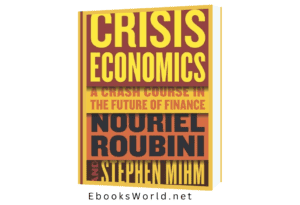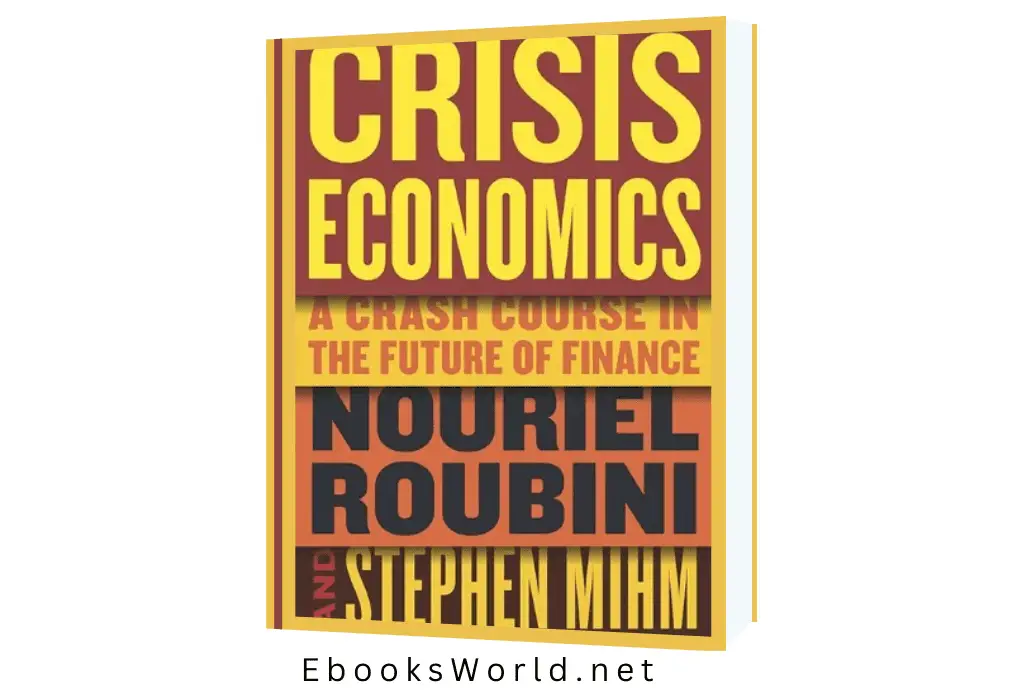Crisis Economics: A Crash Course in the Future of Finance

“Crisis Economics: A Crash Course in the Future of Finance” is a book written by Nouriel Roubini and Stephen Mihm, published in 2010. Roubini, a renowned economist, earned the nickname “Dr. Doom” for predicting the 2008 financial crisis. In this book, he, along with co-author Mihm, provides a comprehensive analysis of the causes, consequences, and potential solutions for economic crises.
Overview:
The book begins by exploring the historical context of economic crises, delving into the roots of financial instability. Roubini and Mihm argue that crises are not isolated incidents but rather recurring events deeply embedded in the structure of the global economy. They emphasize the importance of understanding the systemic vulnerabilities that lead to these crises.
Causes of Crises:
The authors identify several key factors that contribute to economic crises. These include financial innovation, excessive risk-taking by banks and other financial institutions, lax regulation, and the interconnectedness of global markets. The book asserts that the 2008 financial crisis was not a random event but a consequence of a flawed financial system.
The 2008 Financial Crisis:
A significant portion of the book is dedicated to analyzing the 2008 financial crisis. Roubini and Mihm provide a detailed account of the events leading up to the crisis, from the housing market bubble to the collapse of major financial institutions. They argue that the crisis exposed the flaws in the prevailing economic and financial models, revealing the need for a fundamental reevaluation of economic principles.
Lessons Learned:
“Crisis Economics” offers lessons learned from past crises and proposes reforms to prevent future economic disasters. The authors advocate for a more proactive role of government in regulating financial markets, emphasizing the importance of avoiding excessive risk-taking and promoting stability.
Globalization and Interconnectedness:
The book explores the impact of globalization on economic crises, highlighting how the interconnectedness of global markets can amplify the spread of financial contagion. Roubini and Mihm argue that while globalization has brought economic benefits, it has also increased the vulnerability of economies to systemic risks.
Policy Responses:
The authors critically assess the policy responses to the 2008 crisis, including government bailouts and stimulus packages. They discuss the challenges of finding a balance between stabilizing the economy and avoiding moral hazard – the idea that institutions will take excessive risks if they believe they will be bailed out in times of crisis.
The Future of Finance:
In the concluding chapters, Roubini and Mihm speculate on the future of finance. They discuss the need for structural reforms to create a more resilient financial system. The authors argue for increased transparency, stronger regulatory frameworks, and better risk management practices to prevent and mitigate future crises.
Criticisms:
While the book provides a comprehensive analysis of the 2008 financial crisis and offers valuable insights into the causes and consequences of economic downturns, some critics argue that Roubini’s predictions may be overly pessimistic. Additionally, the book’s focus on the 2008 crisis might make it less applicable to readers seeking insights into more recent economic challenges.
Conclusion:
“Crisis Economics” serves as a thought-provoking exploration of the dynamics of economic crises. It encourages readers to critically examine the structural issues within the global financial system and consider the implications of policy decisions. The book provides a timely reminder that, despite periods of economic stability, the risk of future crises remains, and proactive measures are necessary to build a more resilient and sustainable financial system.







